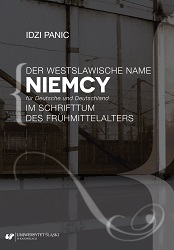Der Westslawische Name Niemcy für Deutsche und Deutschland im Schrifttum des Frühmittelalters
Der Westslawische Name Niemcy für Deutsche und Deutschland im Schrifttum des Frühmittelalters
Author(s): IDZI PANIC
Subject(s): History, Cultural history, Social history
Published by: Wydawnictwo Uniwersytetu Śląskiego
Keywords: West Slavic name Germany; early Middle Ages; Slavs and Germany in the early Middle Ages; Poles; the Czech Republic and Germany in the early Middle Ages
Summary/Abstract: In the Czech and Polish literature of the subject, particularly the linguistic one, for a long time there has been a belief that the name Niemcy appeared among the West Slavs in the early Middle Ages (in a closely undetermined time). The name was used to describe the Germanic tribes that had been neighbouring Slavs since the very earliest moments of the migration of people. As it is widely accepted, the West Slavs coined the name for their Germanic neighbours as their language seemed incomprehensible and indistinct – to quote our southern neighbours: “byli to lidi pro Slovany jakoby nĕmi”, which translates mute (nĕmi) for the Slavs. Therefore, the country, zemĕ Nĕmců, inhabited by incomprehensibly speaking people, mute people, simply had to be called Niemcy. Taking into consideration the fact that the West Slavs – the progenitors of the Czechs and the Poles, the Polabians, and the South-West Slavs were the first to meet Germanic people, it was in this tribal and geographic area where the name Niemcy, describing the Germanic neighbours of the Slavs, was to be created. Consequently, a name for the country inhabited by the Germanic tribes was coined – Niemcy. The name of the tribes and later the country they lived in was adopted by other Slavic tribes and nations in the centuries to come. (part of the chapter: West Slavic name of Niemcy in the early medieval times)
Series: Językoznawstwo
- E-ISBN-13: 978-83-226-3622-0
- Print-ISBN-13: 978-83-226-3621-3
- Page Count: 172
- Publication Year: 2018
- Language: German
- eBook-PDF
- Table of Content
- Introduction

